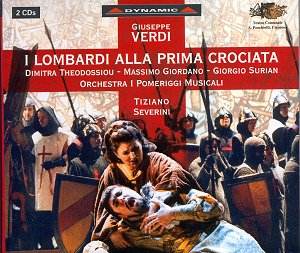After the massive success
of his third opera, Nabucco, at La Scala in 1842, Verdi was quick
to realise that the Italian audience related their situation, under
Austrian occupation, with the oppressed Jews of the opera. Any subject
which showed Italians united against a common enemy would be off to
a flying start in occupied Milan, albeit with the Austrian censor likely
to be a stumbling block. However, it was the Church which took exception
to the subject of the opera and the police chief, a music lover, who
let the libretto pass with only minor amendments, as much for formís
sake as any other.
The first night of I
Lombardi at La Scala on February 1st 1843, eleven months after
the premiere of Nabucco, was a wild popular success. Critics
were more circumspect and noted 'the opera lacks the central vision
which gives purpose and unity to the earlier work'. Indeed, the opera
failed badly in Venice the following year.
The opera dispenses with
an overture, and opens with a short prelude, which leads straight into
the first of several choruses spread throughout the work. The singers
of the chorus are major players in this opera. Here, we have a fair
sized (fifty plus) chorus of Italians singing in their own language.
There is always, and particularly in Verdi, something special about
that combination and so it is here. There are not that many provincial
opera house choruses that can field twenty-one tenors and their contribution
alone gives an added vibrancy to the chorus singing as Crusaders. The
women of the chorus are tasteful, full-toned, and particularly affecting
in the Act 1 'Chorus of Nuns' (CD 1 tr.6)
Although only three of
the opera's characters are listed as for 'prima' voices, Pagano, Oronte
and Giselda, Arvino has a very big sing indeed. He is listed in the
original libretto and cast as 'tenore comprimario'. A weakness of the
casting of this part can seriously undermine any performance of the
opera. In this performance Francesco Picolli sings the part very adequately
with a strong, slightly nasal, tone whilst not being particularly subtle
in phrasing or variety of modulation. These latter characteristics are,
however, to be found in the distinctive and characterful singing of
Giorgio Surian as the 'bad' brother and later hermit. His bass is solid,
true, and strongly projected with a wide range of colour and expression.
Above all it does not spread under pressure. (CD1 tr.19). The Giselda
of Dimitra Theodossiou is also worthy. A lyric soprano with a quick
vibrato, she holds the line well in her Act I prayer (CD1 tr.11) and
has sufficient heft to ride the chorus and orchestra at climaxes. Elsewhere
her characterisation is good whilst her coloratura and trill are, by
the highest standards, a little sketchy. The 'prima tenore' role of
Oronte is unusual in a Verdi work in having relatively little to sing,
featuring, except for his Act 4 prayer from heaven, only in the middle
acts. Massimo Giordano, sings with a strong forward and virile tone
(CD1 tr.17). His prayer, sung offstage, is open voiced, firmly sung
and not forced. He is no putative fourth tenor, but one would welcome
his contribution if met in the theatre. On CD, his rivals are Domingo
(Philips) and Pavarotti (Decca). He is not in their league but he is
not shamed in comparison.
The conductor paces the
work well and has a good feel for a Verdian phrase. He is not afraid
to play the rum-ti-tum Verdian beats of the Crusaders for all they are
worth. The orchestra has moments of thin string tone as at the start
of the great chorus 'Oh Signore' (CD2 tr.10), with its echoes
of ĎVa pensiero', in Nabucco. The recording is clear with
the voices set back as though heard from the rear of the circle or gallery.
There are a few stage noises but they are not overwhelming nor is the
audience applause a cause for concern.
The booklet has an introduction
to the opera in English, German, Italian and French. The full libretto
is translated only into English. The track listing for CD2 is sequential
in numbering with CD1 in the booklet, but not on the disc, which is
tracked in the normal way. To add to the difficulties the numbering
in the booklet for Act 4 is wrong, but not the numbering in the libretto.
Whilst not displacing favourite
studio recordings on Decca or Philips, this is a vibrant recording of
a work that gets few airings in the theatre outside Italy and is a welcome
addition to the catalogue. An earlier live performance of the opera
from Rome in 1969 has had circulation on various labels. It features
Scotto as Giselda, Raimondi as Pagano and Pavarotti as Oronte. Whilst
being well sung it is in poor sound, particularly compared to this recording.
Robert J Farr


